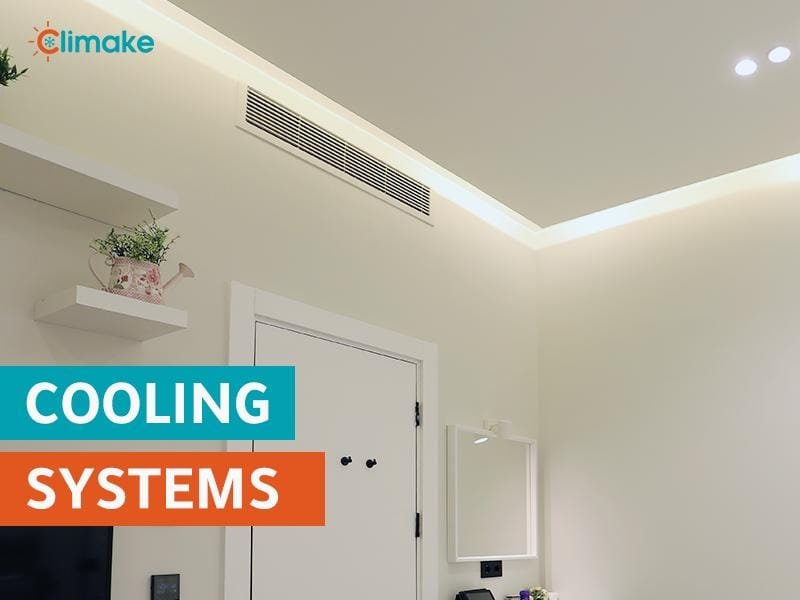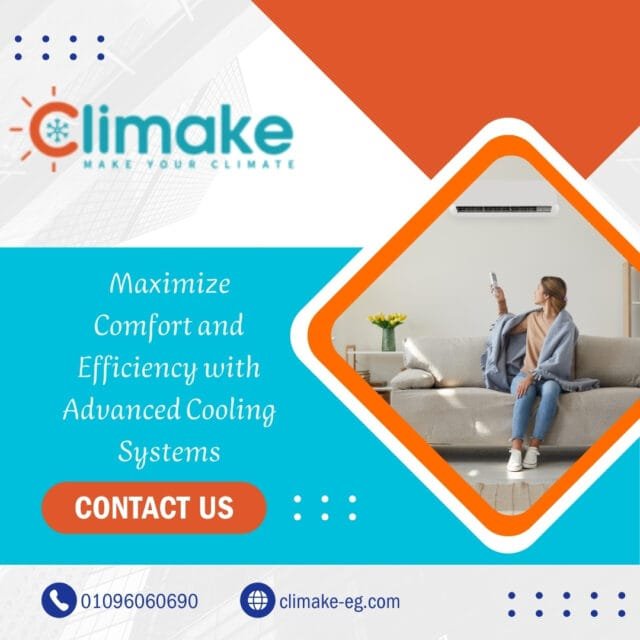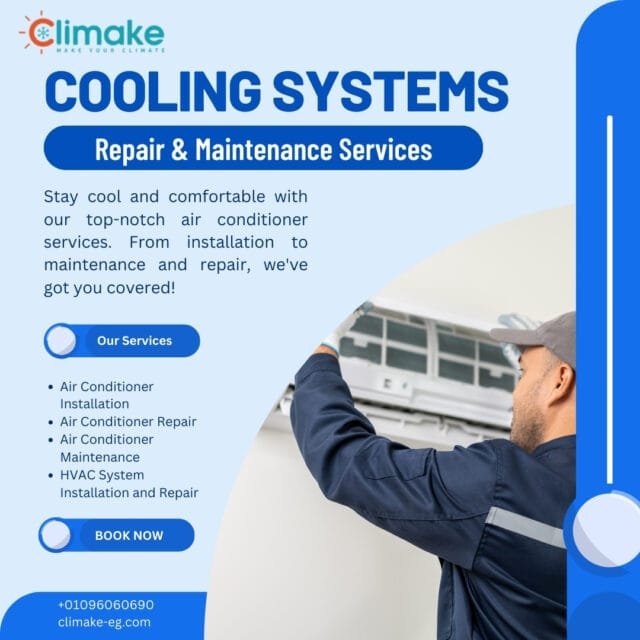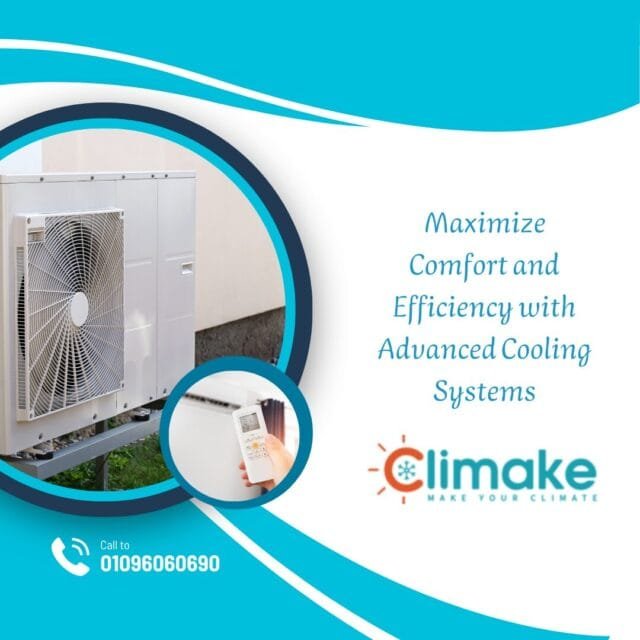As temperatures rise globally, the need for efficient and sustainable cooling systems is more critical than ever. These systems are essential for maintaining comfortable environments in homes, offices, and industrial facilities, while also keeping energy consumption in check. In this comprehensive guide, we’ll explore the different types of cooling systems, how they work, and why upgrading to modern cooling technology can save money and reduce environmental impact. Additionally, we will examine the role of sustainable cooling solutions, solar-powered cooling systems, and the importance of proper cooling systems maintenance.
In this guide, we will explore the various types of cooling systems, how they function, and why upgrading to modern cooling technology can save you money and reduce environmental impact. Additionally, we will delve into sustainable cooling solutions, solar-powered cooling systems, and the importance of proper Climate control systems maintenance.
For professional installation and maintenance of both cooling and heating systems, Climake offers tailored services to meet your specific needs, Contact us today to learn more about how we can improve your indoor climate control and boost energy efficiency throughout the year.
What are cooling systems?
Cooling systems are devices and technologies designed to regulate temperature and humidity in enclosed spaces. They work by removing heat and moisture from the air, making indoor environments more comfortable, Climate control systems range from small air conditioning units for homes to large, complex HVAC systems used in industrial and commercial settings.
The primary goal of cooling systems is to provide consistent, comfortable air temperatures while minimizing energy consumption. Over time, advancements in air conditioning systems and energy-efficient cooling technology have introduced more environmentally-friendly options that reduce energy usage and emissionsoling.
Cooling systems function by transferring heat from indoor spaces to the outside, Most systems especially air conditioning systems, rely on a refrigeration cycle involving a refrigerant gas, This gas absorbs heat from the indoor air and is compressed to release that heat outdoors.
How do cooling systems work?
Most cooling systems, such as air conditioning systems, work through the basic refrigeration cycle. This cycle involves the absorption of heat from the indoor air by refrigerants, which then pass through a compressor that increases their temperature and pressure. The hot refrigerant is then cooled in a condenser, where the heat is released outdoors. The refrigerant, now cooled, returns indoors to absorb more heat, thus continuously cooling the space.
This process is essential for central cooling systems, home cooling systems, and other commercial cooling solutions.
What are the different types of cooling systems available in the market?
Central cooling systems use a single cooling unit to serve an entire building, distributing air through ducts. This type of system is efficient for cooling large spaces, such as office complexes or industrial buildings, where consistent cooling is required.
In contrast, decentralized cooling systems like split air conditioners and ductless mini-splits provide localized cooling for specific areas or rooms.
These systems are ideal for home cooling solutions or smaller offices where individualized control is needed, Here’s an overview of the most common cooling systems:
| Cooling System Type | Description | Advantages | Best Used For |
| Traditional Air Conditioning | Uses refrigerant gases to cool air; commonly installed as window or split units | Easy installation, quick cooling, widely available | Homes, small offices, apartments |
| Central Cooling Systems | Centralized unit distributes cool air through ducts in multiple rooms | Efficient for large spaces, uniform temperature control | Large buildings, malls, offices |
| Evaporative Cooling Systems | Cools air by evaporating water; suitable for dry climates | Low energy consumption, environmentally friendly | Dry regions, industrial spaces |
| Solar-Powered Cooling Systems | Powered by solar panels, reducing reliance on grid electricity | Sustainable, reduces energy bills | Homes, rural areas, sunny locations |
| Industrial Cooling Units | Designed to cool large machinery or industrial processes | Durable, handles high cooling loads | Factories, industrial plants, data centers |
| Ductless Mini-Split Systems | Individual units installed in rooms without ducts, offering flexible cooling | Zone-specific cooling, energy-efficient | Homes, offices, buildings without ducts |
What is the difference between central cooling systems and decentralized cooling systems?
The main difference between central cooling systems and decentralized systems is in their layout and operation, Central systems cool air at a single location and distribute it through a network of ducts to multiple rooms,These systems are often more efficient for large spaces, like commercial buildings or homes with many rooms.
In contrast, decentralized cooling systems, such as window units or ductless mini-splits, cool specific areas independently, They are generally easier to install and are more suitable for smaller buildings or spaces where individual control over room temperatures is needed, Here’s a table that compares central cooling systems and decentralized cooling systems:
| Aspect | Central Cooling Systems | Decentralized Cooling Systems |
| Definition | Uses a single central unit to cool an entire building, distributing air through ducts | Uses multiple individual units to cool specific rooms or areas |
| Best For | Large spaces such as commercial buildings, malls, or multi-room offices | Smaller spaces, homes, or areas where individual zone control is needed |
| Installation | Requires complex ductwork installation throughout the building | Easier installation; no ductwork required in most cases (e.g., mini-splits) |
| Cost | High initial installation costs due to the need for ducts and a large cooling unit | Lower upfront costs but may require multiple units for larger spaces |
| Energy Efficiency | Can be energy-efficient for large areas if well-maintained | Allows for zone-specific cooling, reducing energy consumption by cooling only needed areas |
| Control | Centralized control for the whole building, often lacks individual room control | Offers individual room or zone control, providing more flexibility |
| Maintenance | Requires regular ductwork maintenance and central system servicing | Easier maintenance as each unit is independent, but multiple units may increase overall maintenance |
| Examples | Large HVAC systems, packaged rooftop units (RTUs) | Split air conditioners, ductless mini-splits, window ACs |
.
VRF System: The Future of Commercial and Luxury Cooling
-
Definition: VRF (Variable Refrigerant Flow) is an advanced technology within Central cooling systems.
-
Energy Savings: Achieves 30% to 40% savings compared to traditional systems.
-
Technical Advantage: Uses Variable Speed Compressors to adjust refrigerant flow based on the exact demand of each zone.
-
Control: Allows for precise, individual temperature control in dozens of zones with a single outdoor unit.
-
Climake Service: Climake specializes in VRF installation to ensure quiet operation and optimal performance for complex commercial projects.
How to choose the most suitable cooling system for homes versus commercial buildings?
When choosing the most suitable Refrigeration systems for homes versus commercial buildings, several factors should be taken into account to ensure the system fits the needs and constraints of the environment, Here’s a breakdown of the essential considerations:
1. Building Size and Layout
- Home Cooling Systems: For homes, the system needs to match the size and structure, Small to medium-sized homes benefit from ductless mini-split systems or central air conditioning systems, as they can provide consistent cooling for individual rooms or the whole house, Ductless systems are particularly useful for homes without existing ductwork and offer zonal cooling, allowing independent temperature control for each room.
- Commercial Cooling Solutions: Commercial buildings, particularly large offices or retail spaces, require more powerful systems like rooftop units or large-scale central cooling systems, These systems are designed to handle the higher cooling loads required by larger spaces, multiple floors, and heavy equipment use. For commercial spaces, it’s critical to consider the building’s design to ensure even air distribution across the floors.
2. Cooling Load Requirements
- Home Cooling Systems: Homes typically have lower cooling load requirements. A central air conditioning unit or even evaporative cooling systems may suffice in moderate climates. For homes with larger areas or higher heat gains, a multi-zone ductless system might be ideal.
- Commercial Cooling Solutions: Commercial buildings need robust systems that can manage higher cooling demands due to more occupants, larger areas, and equipment like computers and machinery, HVAC systems with packaged rooftop units are often used because they are scalable and can provide effective cooling across large commercial spaces, including warehouses and office buildings.
3. Energy Efficiency
- Home Cooling Systems: Residential systems should be energy-efficient to reduce monthly energy bills. Systems with a high SEER (Seasonal Energy Efficiency Ratio) rating are recommended, as they offer better efficiency by using less energy to cool the same space, Additionally, homeowners can benefit from technologies like smart thermostats, which allow for more precise temperature control and energy savings.
- Commercial Cooling Solutions: In commercial settings, energy consumption is a significant factor. Selecting systems with a high SEER rating or using variable refrigerant flow (VRF) systems can help manage cooling costs in commercial buildings. Additionally, energy-efficient HVAC systems may offer long-term savings, despite higher upfront costs. Integrating advanced controls, such as building automation systems (BAS), can further optimize energy use.
4. Budget Considerations
- Home Cooling Systems: Residential cooling systems, like ductless or central units, are generally more affordable than commercial systems However, homeowners should weigh the cost of installation versus long-term operational costs, For instance, investing in energy-efficient systems can reduce electricity costs over time, Systems with climake certifications often provide a balance between upfront costs and future savings.
- Commercial Cooling Solutions: Commercial buildings demand higher initial investments due to the complexity and scale of systems like central chillers or rooftop units. However, they may benefit from government incentives or rebates for installing energy-efficient cooling systems, reducing the total cost of ownership. Financing options and maintenance contracts are often considered in commercial installations to offset the high upfront cost.
Actual Savings: The ROI Calculator for Modern Systems
-
Goal: Justify the higher initial cost of energy-efficient systems.
-
Key Benefit: Modern systems (Mini-Split and VRF) eliminate energy waste from duct leakage, which can be 20-30% in older systems.
-
Commercial Payback: The higher installation cost for a commercial VRF system is typically recovered in 3 to 5 years due to significant energy bill reductions.
-
Climake Service: Climake provides detailed energy audits and ROI projections to make your purchasing decision financially sound.
5. System Flexibility and Control
- Home Cooling Systems: For homeowners, flexibility in controlling the system is essential. A smart cooling system with features like mobile app control, remote monitoring, and zonal cooling can enhance comfort while reducing energy waste. Systems that allow individual room temperature control are ideal for households with varying cooling preferences.
- Commercial Cooling Solutions: Commercial spaces often require complex temperature management systems that can adapt to different areas. Large buildings may benefit from zoning systems or integrated ventilation and cooling solutions that allow for controlling temperature across different zones based on usage and occupancy. Smart technologies and IoT-enabled HVAC systems can also help in monitoring and adjusting the climate in real-time.
In conclusion, the choice between home Climate control systems and commercial cooling solutions depends heavily on the specific needs of the space. Residential systems focus on comfort and energy savings, while commercial systems prioritize scalability, efficiency, and the ability to handle large, complex environments. Both settings benefit from energy-efficient solutions that can be tailored to individual or building-wide requirements.
Read also: Enchanting Cooling Solutions for Unmatched Comfort from Climake
Mini-Splits in Egyptian Homes: Pros, Cons, and Installation Expertise
| Pros (Climake Advantage) | Cons (Climake Solution) |
| Up to 30% energy savings and excellent zonal control. | Aesthetics: Multiple indoor units can be visually obtrusive. |
| Quick and non-invasive installation; ideal for homes without existing ductwork. | Multiple outdoor units are required for multi-zone systems, consuming more exterior space. |
| Inverter technology ensures quiet, highly efficient, and consistent cooling. | Less effective at providing uniform temperature across very large, open floor plans. |
| Climake Solution: We offer concealed and ceiling-cassette options to meet aesthetic demands. |
What are the energy efficiency standards in cooling systems and how can they be improved?
Energy-efficient cooling systems are designed to use less energy while providing the same cooling effect, These systems often have higher SEER ratings and may incorporate features like variable-speed compressors that adjust to cooling demand in real-time. Using programmable thermostats, sealing ducts, and upgrading insulation can also improve the efficiency of cooling systems.
Energy-efficient cooling is especially important for reducing operating costs and environmental impact, For instance, HVAC systems with modern inverter technology use less power during off-peak times, significantly improving their energy performance.
What are the benefits of using modern cooling systems compared to traditional ones?
Modern cooling systems offer several advantages over traditional ones, They are more energy-efficient, have better environmental controls, and often include smart technology for remote management, Innovations like solar-powered cooling systems reduce reliance on non-renewable energy sources, making them more sustainable.
Moreover, modern systems are quieter, offer better air filtration, and can be customized to suit specific building needs. This makes them ideal for both “residential cooling systems” and commercial cooling solutions.
Here’s a table comparing Conventional Air Conditioners and Modern Cooling Systems, based on the provided paragraph and the included keywords such as HFCs, solar-powered cooling solutions, and environmentally-friendly cooling systems:
| Aspect | Conventional Air Conditioners | Modern Cooling Systems |
| Refrigerant Type | Uses older refrigerants like HFCs, which contribute to global warming | Uses environmentally-friendly refrigerants such as natural gases (e.g., CO2, ammonia) |
| Energy Efficiency | Consumes more energy, less efficient | More energy-efficient, incorporates advanced technologies |
| Environmental Impact | Higher carbon footprint due to HFCs | Environmentally-friendly cooling systems with lower emissions |
| Technology | Relies on outdated cooling technologies | Utilizes solar-powered cooling solutions and smart technology |
| Upfront Cost | Lower initial cost | Higher upfront cost due to advanced technology |
| Long-Term Savings | Limited long-term savings, higher energy bills and maintenance costs | Significant long-term savings from reduced energy consumption and maintenance |
Read also:The Benefits of Installing a Central Heating System with Radiators for Modern Homes
What is the cost of installing and operating different cooling systems in Egypt?
Climate control systems in Egypt can vary widely in cost depending on several key factors. For cooling systems installation, the following factors significantly influence costs:
1. Type of Cooling System
Different systems such as split air conditioners, central cooling systems, and solar-powered cooling solutions have varying installation costs, For example, home cooling solutions like split ACs are more affordable compared to larger systems like central cooling used in commercial buildings.
2. Size of the Building
The larger the space, the more powerful and complex the system needs to be, A larger building would require a more advanced central cooling system, which increases both installation and operation costs.
3. Energy Efficiency
Energy-efficient cooling systems may have a higher upfront installation cost due to advanced technology, but they provide significant long-term savings by lowering energy consumption. These systems can help reduce operating costs, making them a cost-effective option in the long run.
4. Climate and Location
The geographical area and local climate conditions can affect the cost, especially when choosing between systems like evaporative cooling (ideal for dry climates) versus conventional air conditioning solutions, Operating costs in hot climates, such as Egypt, can also be higher if the system is not energy-efficient.
5. Maintenance Requirements
Regular cooling systems maintenance is essential to ensure efficiency and avoid expensive repairs. Systems that use modern cooling technology, such as solar-powered cooling systems, may have lower maintenance costs due to fewer mechanical components compared to traditional systems
By considering these factors, businesses and homeowners can select the most appropriate and cost-effective cooling solution based on their specific needs.
How are cooling systems maintained to ensure optimal performance?
Maintaining cooling systems is crucial to ensure that they run efficiently and last longer, Regular maintenance helps prevent breakdowns, reduces energy consumption, and keeps cooling systems operating at peak performance. Below are the key tasks involved in maintaining Climate control systems:
1. Cleaning Air Filters
Dust and debris can clog air filters, reducing airflow and forcing the system to work harder.
Regular cleaning or replacing of filters improves airflow and boosts energy efficiency, preventing the system from overworking.
2. Checking Refrigerant Levels
Ensuring that refrigerant levels are optimal is essential for efficient cooling, Low refrigerant levels can reduce the system’s cooling capacity and increase energy consumption, A technician must check for leaks and refill the refrigerant as needed.
3.Inspecting for Leaks
Leaks in the ductwork or the system can lead to significant energy loss, reducing cooling effectiveness, A regular inspection helps detect any cracks or issues that could cause leaks and ensures timely repairs.
4. Cleaning Coils
Both evaporator and condenser coils accumulate dirt over time, which reduces the system’s efficiency, Cleaning the coils ensures optimal heat transfer and prevents the system from overheating.
5. Checking Thermostat Settings
Ensuring that the thermostat is set to the appropriate temperature and functioning properly helps the system run efficiently.
Smart thermostats can be used to automatically adjust settings based on usage and ambient conditions.
6. Lubricating Moving Parts
All moving components, such as fan motors and bearings, require proper lubrication to reduce friction.
This helps prevent wear and tear, keeping the system running smoothly.
7. Testing Controls and Safety Features
Maintenance checks include testing the system’s controls to ensure it turns on and off correctly, as well as checking safety features that protect the unit from damage.
Companies like Climake offer comprehensive cooling maintenance services that cover all these tasks, ensuring your cooling systems operate efficiently throughout the year, Regular professional maintenance can extend the system’s lifespan and reduce long-term energy costs.
What are eco-friendly cooling solutions and how do they contribute to reducing energy consumption?
Environmentally-friendly cooling solutions use renewable energy sources or passive cooling techniques to reduce energy consumption. For instance, solar-powered cooling systems harness solar energy to provide cooling, greatly reducing reliance on traditional electricity. Passive cooling, like using natural ventilation or cool roofing materials, also helps maintain indoor temperatures without consuming much energy.
How can solar energy be used in cooling systems?
Solar-powered cooling are gaining popularity as an alternative to conventional energy-intensive systems, These systems utilize solar panels to generate the electricity needed to power air conditioning units or other cooling devices, In hot climates, like Egypt’s, solar energy is abundant and provides a sustainable, cost-effective solution for residential and commercial cooling.
What smart technologies are used in cooling systems to control temperatures?
Modern cooling technology increasingly incorporates smart thermostats, IoT integration, and AI-driven climate control to optimize energy use. These systems can learn user preferences, adjust settings based on occupancy, and even be controlled remotely through smartphone apps, Such advancements enhance convenience and help reduce energy waste.
Read also: Bringing Ultimate Comfort How Central Heating System with Heaters Transform Your Home
How does integrated ventilation and cooling affect indoor air quality?
Proper ventilation plays a crucial role in maintaining good indoor air quality, which is a key component of HVAC systems, Integrated systems that manage both cooling and ventilation ensure fresh air is circulated, preventing the buildup of allergens, pollutants, and excess humidity.
This is particularly important in commercial and residential buildings where occupants spend extended periods indoors.
What are the challenges facing Egypt’s cooling systems and how can they be overcome?
Egypt faces several challenges in cooling, including high energy demand, reliance on traditional electricity sources, and the growing need for sustainable solutions.
These challenges can be mitigated by promoting energy-efficient systems, investing in solar-powered cooling, and encouraging the adoption of smart technologies, Government incentives for eco-friendly systems can also help drive the transition towards more sustainable cooling solutions.
In conclusion, cooling are essential for maintaining comfortable, energy-efficient environments in both residential and commercial settings.
Whether you are looking for air conditioning systems for your home or advanced central cooling for large commercial spaces, selecting the right system can significantly reduce operational costs while enhancing comfort.
In addition to cooling, maintaining optimal indoor temperatures during colder months is equally important. Climake not only provides cutting-edge Climate control systems, but also offers expert solutions for heating systems, Their comprehensive services ensure year-round comfort through efficient, reliable heating and cooling.
If you’re in Egypt and looking for expert advice, installation, and maintenance of cooling and heating systems, Climake is the ideal partner, With extensive experience in residential cooling systems, commercial cooling solutions, and industrial Climate control systems, Climake offers top-notch services tailored to the unique demands of the Egyptian climate.
-
Local Challenge: High peak energy demand and reliance on traditional electricity sources.
-
Solar Solutions: Climake specializes in installing Hybrid Solar Cooling systems to reduce reliance on the grid during peak summer hours.
-
Efficiency Standard: Focus on systems with high EER2 ratings, which measure efficiency at peak thermal load (crucial for the hot Egyptian climate).
-
Quality and Safety: Integration of advanced ventilation within Climate control systems to manage indoor air quality and humidity.
From cooling and heating units installation to regular system maintenance, they ensure your systems run efficiently, helping you save on energy bills while contributing to a sustainable future.
Visit our nearest branch at “2 Ali Amin Street, Nasr City, Cairo, Egypt”
Contact us at these numbers: +20 109 6060 690 / +20 102 0016 998





